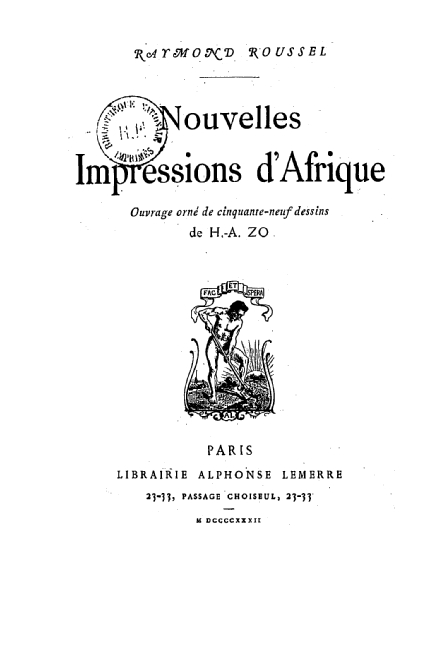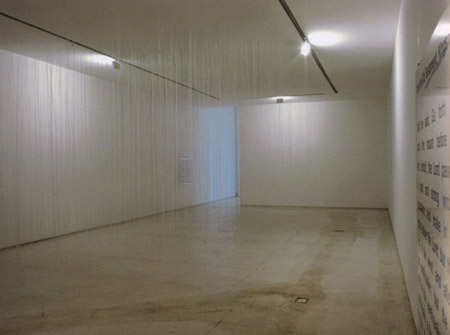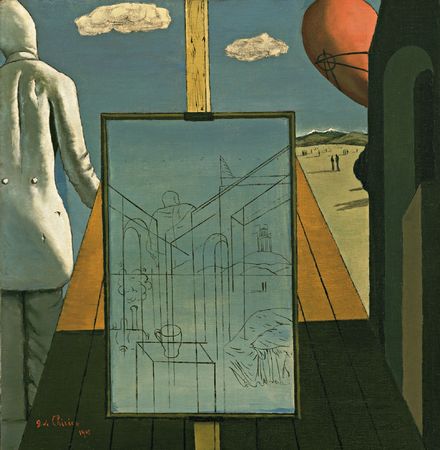(Busby Berkeley, from Gold Diggers of 1933.)
Monthly Archives: April 2009
april 6–april 11
Books
- Paul Fattaruso, Bicycle
- Samuel R. Delany, The Fall of the Towers
- Dorothy Kosinski, Dialogues: Duchamp, Cornell, Johns, Rauschenberg
Exhibits
- “Cézanne & Beyond”, Philadelphia Museum of Art
- “Henri Matisse and Modern Art on the French Riviera”, Philadelphia Museum of Art
- “Daidō Moriyama: Tokyo Photographs”, Philadelphia Museum of Art
- Pennsylvania Academy of the Fine Arts
nouvelles impressions d’afrique
still waves of probability
train rising out of the sea
It is written in the Book of Usable Minutes
That all things have their center in their dying,
That each is discrete and diaphanous and
Has pointed its prow away from the sand for the next trillion years.
After that we may be friends,
Recognizing in each other the precedents that make us truly social.
Do you hear the wind? It’s not dying,
It’s singing, weaving a song about the president saluting the trust,
The past in each of us, until so much memory becomes an institution,
Through sheer weight, the persistence of it, no,
Not the persistence: that makes it seem a deliberate act
Of duration, much too deliberate for this ingenious being
Like an era that refuses to come to an end or be born again.
We need more night for the sky, more blue for the daylight
That inundates our remarks before we can make them
Taking away a little bit of us each time
To be deposited elsewhere
In the place of our involvement
With the core that brought excessive flowering this year
Of enormous sunsets and big breezes
That left you feeling too simple
Like an island just off the shore, one of many, that no one
Notices, though it has a certain function, though an abstract one
Built to prevent you from being towed to shore.
(John Ashbery, from As We Know.)
23. we two—how long we were fool’d
We two—how long we were fool’d!
Now transmuted, we swiftly escape, as Nature escapes;
We are Nature—long have we been absent, but now we return;
We become plants, leaves, foliage, roots, bark;
We are bedded in the ground—we are rocks;
We are oaks—we grow in the openings side by side;
We browse—we are two among the wild herds, spontaneous as any;
We are two fishes swimming in the sea together;
We are what the locust blossoms are—we drop scent around the lanes, mornings and evenings;
We are also the coarse smut of beasts, vegetables, minerals;
We are two predatory hawks—we soar above, and look down;
We are two resplendent suns—we it is who balance ourselves, orbic and stellar—we are as two comets;
We prowl fang’d and four-footed in the woods—we spring on prey;
We are two clouds, forenoons and afternoons, driving overhead;
We are seas mingling—we are two of those cheerful waves, rolling over each other, and interwetting each other;
We are what the atmosphere is, transparent, receptive, pervious, impervious:
We are snow, rain, cold, darkness—we are each product and influence of the globe;
We have circled and circled till we have arrived home again—we two have;
We have voided all but freedom, and all but our own joy.
(Walt Whitman, from Leaves of Grass.)
from “the bungalows”
You who were directionless, and thought it would solve everything if you found one,
What do you make of this? Just because a thing is immortal
Is that any reason to worship it? Death, after all, is immortal.
But you have gone into your houses and shut the doors, meaning
There can be no further discussion.
And the river pursues its lovely course
With the sky and the trees cast up from the landscape
For green brings unhappiness—le vert porte malheur.
“The chartreuse mountain on the absinthe plain
Makes the strong man’s tears tumble down like rain.”
All this came to pass eons ago.
Your program worked out perfectly. You even avoided
The monotony of perfection by leaving in certain flaws:
A backward way of becoming, a forced handshake,
An absent-minded smile, though in fact nothing was left to chance.
Each detail was startlingly clear, as though seen through a magnifying glass,
Or would have been to an ideal observer, namely yourself—
For only you could watch yourself so patiently from agar
The way God watches a sinner on the path to redemption.
Sometimes disappearing into valleys, but always on the way,
For it all builds up into something, meaningless or meaningful
As architecture, because planned and then abandoned when completed,
To live afterwards, in sunlight and shadow, a certain amount of years.
Who cares about what was there before? There is no going back,
For standing still means death, and life is moving on,
Moving on towards death. But sometimes standing still is also life.
(John Ashbery, from The Double Dream of Spring.)
april 4–april 5
Books
- Jacques Roubaud, The Form of the City Changes Faster, Alas, than the Human Heart, trans. Keith Waldrop & Rosmarie Waldrop
- John Ashbery, Some Trees
- John Ashbery, The Tennis Court Oath
- John Ashbery, The Double Dream of Spring
Films
- Return to Oz, directed by Walter Murch
- My Dinner with Andre, dir. Louis Malle
Exhibits
- “Kenneth Anger”, P.S.1
- “Leandro Erlich: Swimming Pool”, P.S.1
the double dream of spring
sonnet
The barber at his chair
Clips me. He does as he goes.
He clips the hairs outside the nose.
Too many preparations, nose!
I see the raincoat this Saturday.
A building is against the sky—
The result is more sky.
Something gathers in painfully.
To be the razor—how would you like to be
The razor, blue with ire,
That presses me? This is the wrong way.
The canoe speeds toward a waterfall.
Something, prince, in our backward manners—
You guessed the reason for the storm.
(John Ashbery, from Some Trees.)


